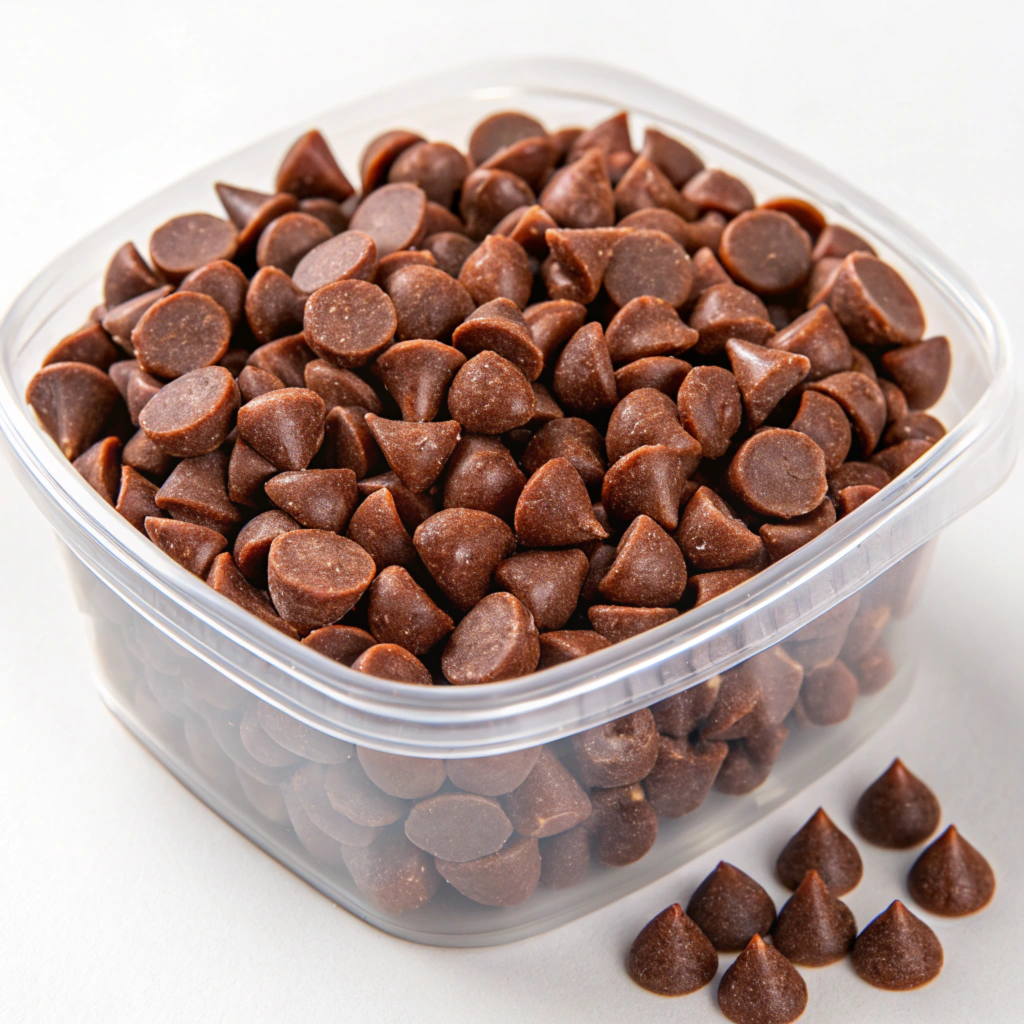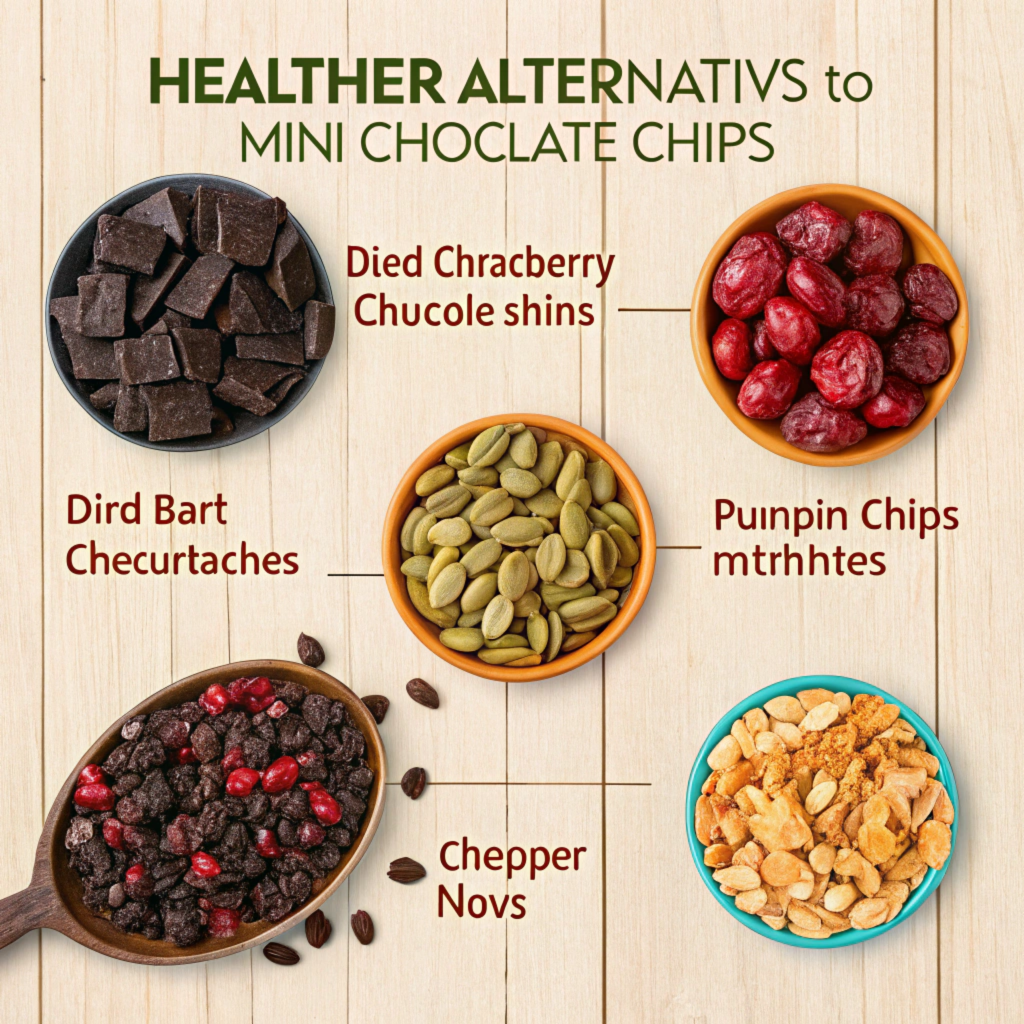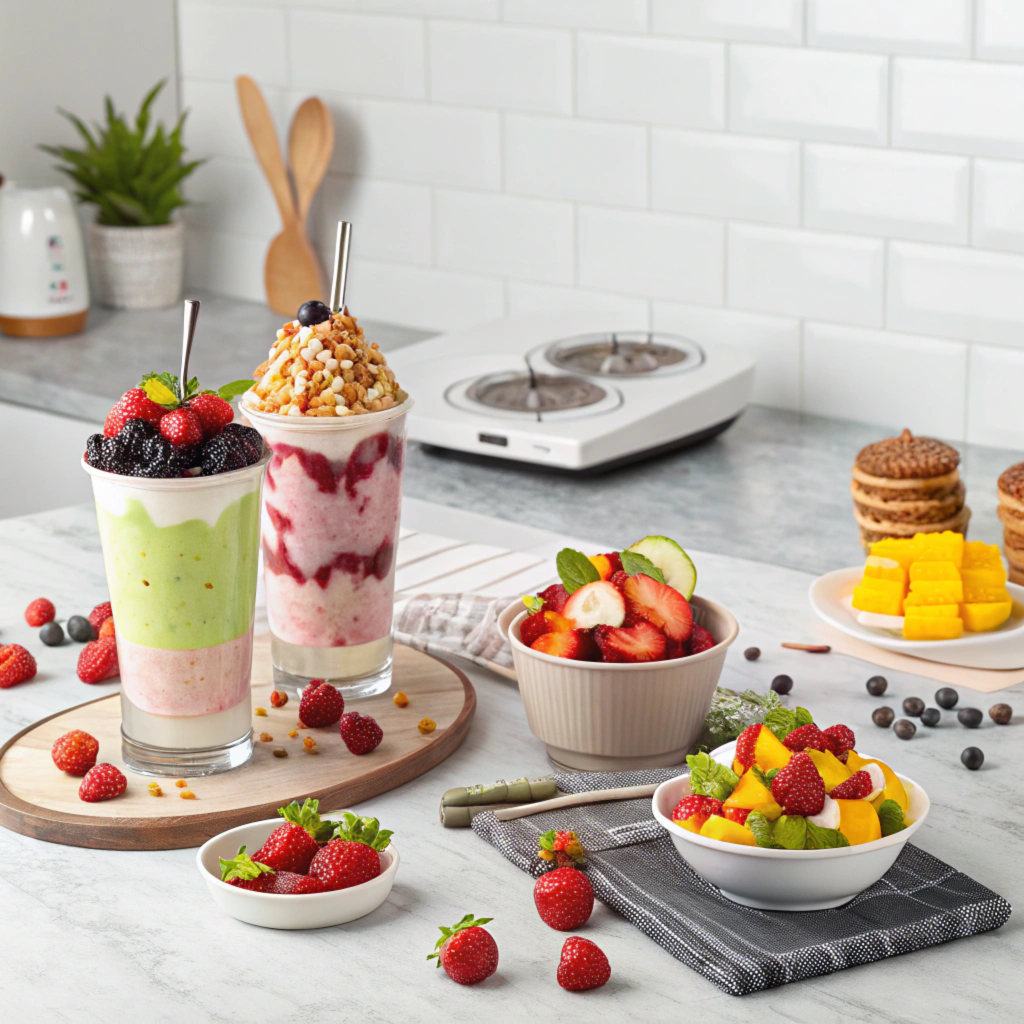
What Are Mini Chocolate Chips?
Mini chocolate chips are a smaller, bite-sized version of regular chocolate chips. They’re made to distribute evenly in recipes, ensuring every bite contains a hint of chocolate. Their small size makes them ideal for delicate desserts, where larger chunks might overwhelm the texture or appearance. Found in a variety of chocolate types, including milk, dark, and semi-sweet, mini chocolate chips are beloved for their versatility in cookies, muffins, and even pancakes.
Why Would You Need a Substitute for Mini Chocolate Chips?
Though mini chocolate chips are a staple in many recipes, there are instances where a substitute is necessary. Whether you’re out of mini chocolate chips or looking to experiment with a new flavor, understanding alternatives can save the day.
Common Scenarios for Substitution:
- Availability: Mini chocolate chips aren’t always stocked in every pantry or grocery store.
- Dietary Needs: Some individuals might require dairy-free, sugar-free, or healthier options.
- Flavor Preferences: A recipe might benefit from a unique flavor twist, like butterscotch or peanut butter.
- Texture Adjustments: Some baked goods call for a smoother or chunkier consistency than what mini chips offer.
Tips for Choosing the Right Substitute:
- Match the Texture: Select substitutes that mimic the small size or melting quality of mini chips for the best results.
- Consider the Flavor Profile: Choose substitutes that complement your recipe’s overall taste without overpowering other ingredients.
- Think About Melting Behavior: Some replacements might melt faster or slower than mini chocolate chips, which could impact the final texture.
Best Substitutes for Mini Chocolate Chips
Regular-Sized Chocolate Chips
Regular-sized chocolate chips are the most straightforward substitute for mini chocolate chips. Since they’re made from the same base ingredients, they offer a similar flavor profile and melting behavior, making them a reliable option in most recipes.
How to Adjust Recipes for Larger Chips
When using regular-sized chocolate chips, you may need to adjust the quantity slightly. Because they are larger, fewer chips fit into a single cup compared to mini chips. Measure carefully to ensure you maintain the intended balance of sweetness and texture in your recipe.
When to Use This Option
Regular-sized chips work best in recipes where their larger size won’t disrupt the texture, such as cookies or brownies. Avoid using them in delicate baked goods like thin-layered cakes, where their bulk may create unevenness.
Chocolate Chunks or Bars
Chocolate chunks or bars are another excellent substitute for mini chocolate chips. They offer a more rustic appearance and provide a decadent, gooey texture when baked.
Breaking Down Chocolate Bars for Recipes
To use chocolate bars as a substitute, chop them into small, uniform pieces with a knife. Aim to match the size of mini chips to ensure even distribution in your batter or dough.
Pros and Cons of Using Chocolate Chunks
Pros:
- They create pockets of rich, melted chocolate in baked goods.
- Chunks can add a gourmet aesthetic to your recipe.
Cons:
- They may melt unevenly, depending on their size.
- Extra preparation time is required to chop the chocolate bar.
Cocoa Nibs or Dark Chocolate Pieces
For a healthier alternative, cocoa nibs or dark chocolate pieces provide a rich and intense chocolate flavor. These options are less sweet but pair beautifully with recipes that don’t rely solely on sugar for flavor.
Healthier Alternatives to Mini Chocolate Chips

Cocoa nibs are made from roasted cacao beans and contain no added sugar, making them ideal for health-conscious bakers. Similarly, dark chocolate pieces (70% cacao or higher) offer antioxidant benefits.
Flavor and Texture Considerations
Keep in mind that cocoa nibs are crunchy and slightly bitter, while dark chocolate pieces melt more like traditional chocolate chips. These qualities make them better suited for recipes like granola, trail mix, or artisan-style cookies.
Non-Chocolate Substitutes for Mini Chocolate Chips
Carob Chips
Carob chips are a popular non-chocolate alternative that mimic the texture of chocolate chips while offering a naturally sweet flavor. Derived from the carob tree, these chips are caffeine-free and suitable for individuals with dietary restrictions.
What Are Carob Chips, and How Do They Compare?
Carob chips have a mild, nutty sweetness that differs from the richness of chocolate. They contain no caffeine or theobromine, making them ideal for those sensitive to these compounds or seeking a healthier option.
Best Recipes for Using Carob Chips
Carob chips are perfect in recipes like oatmeal cookies, granola bars, and muffins. Their naturally sweet profile allows them to complement wholesome ingredients such as nuts, oats, and dried fruit.
White Chocolate Chips or Yogurt Chips
White chocolate chips or yogurt chips offer a sweet, creamy substitute for mini chocolate chips. These alternatives bring a different flavor profile while maintaining a similar texture and melting behavior.
Sweet and Creamy Substitutions
White chocolate chips are made from cocoa butter, sugar, and milk solids, offering a smooth and rich taste. Yogurt chips, on the other hand, are tangy and slightly sweet, ideal for creating a fresh twist in desserts.
Ideal Use Cases for White Chocolate Chips
These substitutes work well in recipes like sugar cookies, blondies, or fruit-studded muffins. Yogurt chips, in particular, shine in recipes that feature berries or citrus flavors, adding a creamy balance to tart ingredients.
Butterscotch Chips or Peanut Butter Chips
For a unique twist, butterscotch or peanut butter chips bring bold flavors to your baked goods. These substitutes can transform traditional recipes into something entirely new and exciting.
Adding a Unique Flavor Twist
Butterscotch chips deliver a caramel-like sweetness, while peanut butter chips offer a rich, nutty taste. Both options are great for adding depth to desserts without overwhelming the dish.
Recipes That Work Well with These Substitutes
Butterscotch chips are ideal for classic oatmeal cookies, while peanut butter chips excel in recipes like chocolate-peanut butter brownies or no-bake treats. These chips also pair beautifully with spices like cinnamon or nutmeg.
Non-Chocolate Substitutes for Mini Chocolate Chips
Carob Chips
Carob chips are a popular non-chocolate alternative that mimic the texture of chocolate chips while offering a naturally sweet flavor. Derived from the carob tree, these chips are caffeine-free and suitable for individuals with dietary restrictions.
What Are Carob Chips, and How Do They Compare?
Carob chips have a mild, nutty sweetness that differs from the richness of chocolate. They contain no caffeine or theobromine, making them ideal for those sensitive to these compounds or seeking a healthier option.
Best Recipes for Using Carob Chips
Carob chips are perfect in recipes like oatmeal cookies, granola bars, and muffins. Their naturally sweet profile allows them to complement wholesome ingredients such as nuts, oats, and dried fruit.
White Chocolate Chips or Yogurt Chips
White chocolate chips or yogurt chips offer a sweet, creamy substitute for mini chocolate chips. These alternatives bring a different flavor profile while maintaining a similar texture and melting behavior.
Sweet and Creamy Substitutions
White chocolate chips are made from cocoa butter, sugar, and milk solids, offering a smooth and rich taste. Yogurt chips, on the other hand, are tangy and slightly sweet, ideal for creating a fresh twist in desserts.
Ideal Use Cases for White Chocolate Chips
These substitutes work well in recipes like sugar cookies, blondies, or fruit-studded muffins. Yogurt chips, in particular, shine in recipes that feature berries or citrus flavors, adding a creamy balance to tart ingredients.
Butterscotch Chips or Peanut Butter Chips
For a unique twist, butterscotch or peanut butter chips bring bold flavors to your baked goods. These substitutes can transform traditional recipes into something entirely new and exciting.
Adding a Unique Flavor Twist
Butterscotch chips deliver a caramel-like sweetness, while peanut butter chips offer a rich, nutty taste. Both options are great for adding depth to desserts without overwhelming the dish.
Recipes That Work Well with These Substitutes
Butterscotch chips are ideal for classic oatmeal cookies, while peanut butter chips excel in recipes like chocolate-peanut butter brownies or no-bake treats. These chips also pair beautifully with spices like cinnamon or nutmeg.
Baking Tips When Substituting Mini Chocolate Chips
Balancing Texture and Flavor
When replacing mini chocolate chips in a recipe, it’s essential to maintain a balance between texture and flavor. Mini chips distribute evenly, so their substitutes should mimic this effect to avoid overwhelming certain parts of the dish. Consider how the replacement’s size, shape, and taste will affect the final product.
Measuring Substitutes Correctly
To achieve accurate proportions, use the following tips:
- Measure by Volume or Weight: If the recipe calls for 1 cup of mini chips, use 1 cup of your substitute, ensuring you account for the size difference. For smaller substitutes like cocoa nibs, weigh them for precise consistency.
- Adjust for Density: Larger substitutes may take up more space. Break down chunks or bars to match the recipe’s intent, maintaining even distribution throughout the batter.
Avoiding Melting and Spreading Issues
Substitutes may behave differently in the oven, potentially altering your dessert’s texture or appearance. Here’s how to avoid common pitfalls:
- Monitor Baking Times: Larger substitutes like chocolate chunks may melt more slowly than mini chips. Keep an eye on the oven to prevent overbaking.
- Use Stabilizing Ingredients: Add a teaspoon of flour or cornstarch to the batter if you’re worried about substitutes melting excessively and affecting the structure of cookies or cakes.
- Chill Before Baking: If using substitutes prone to melting, such as yogurt or peanut butter chips, chill the dough before baking to maintain their shape.

Creative Uses for Mini Chocolate Chip Substitutes
Dessert Applications Beyond Baking
Mini chocolate chip substitutes aren’t just for baked goods—they can elevate a variety of desserts. From frozen treats to creative confections, these alternatives add flavor and texture in unique ways.
Using Substitutes in Ice Cream or Toppings
Whether you’re crafting homemade ice cream or enhancing store-bought varieties, substitutes like chocolate chunks, white chocolate chips, or butterscotch chips work beautifully. Here’s how:
- Ice Cream Mix-Ins: Stir chopped chocolate bars or cocoa nibs into softened ice cream for a crunchy surprise.
- Toppings: Sprinkle yogurt chips, peanut butter chips, or even carob chips over sundaes or milkshakes for added flavor and visual appeal.
Crafting Unique Gift Treats
Substitutes can transform your desserts into standout gifts. Use them to create thoughtful treats that leave a lasting impression:
- Customizable Chocolate Bark: Melt white or dark chocolate and mix in substitutes like butterscotch chips or cocoa nibs. Spread the mixture on parchment paper, let it harden, and break into pieces.
- Trail Mix: Combine carob chips, nuts, dried fruit, and granola for a healthy, portable snack that’s perfect for gifting.
- Decorative Toppers: Use substitutes to decorate cupcakes or cookies, creating a personal touch for celebrations or special occasions.
FAQs About Substituting Mini Chocolate Chips
1. Can I use regular chocolate chips instead of mini chocolate chips?
Yes, regular chocolate chips are an excellent substitute for mini chocolate chips. However, you might need to adjust the quantity slightly to ensure even distribution in your recipe.
2. Are there healthier options for mini chocolate chips?
Cocoa nibs and dark chocolate pieces are great healthier alternatives. They have less sugar and are packed with antioxidants, making them ideal for health-conscious recipes.
3. Can white chocolate chips replace mini chocolate chips in any recipe?
White chocolate chips can be used as substitutes, but they bring a sweeter and creamier flavor. They work best in recipes that complement their unique taste, like sugar cookies or blondies.
4. Do substitutes melt the same way as mini chocolate chips?
Not always. Some substitutes, like cocoa nibs, won’t melt at all, while others, like chocolate chunks, may melt unevenly. To avoid issues, consider chilling your dough or adjusting baking times.
5. What’s the best non-chocolate substitute for mini chocolate chips?
Carob chips are a popular non-chocolate alternative. They’re naturally sweet, caffeine-free, and work well in recipes like oatmeal cookies or granola bars.
6. How do I measure substitutes for mini chocolate chips accurately?
Measure substitutes by volume or weight, keeping in mind their size difference. For example, break larger substitutes like chocolate bars into smaller pieces to ensure consistency.
7. Can I mix multiple substitutes in one recipe?
Absolutely! Combining substitutes, like white chocolate chips and peanut butter chips, can add a complex flavor profile to your desserts. Experiment to find your favorite combinations.